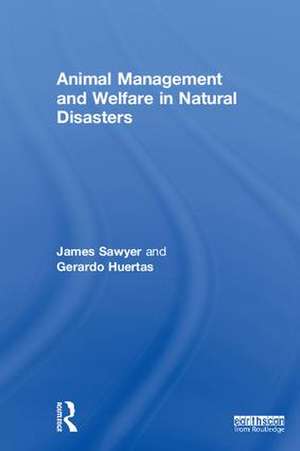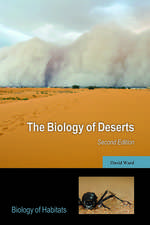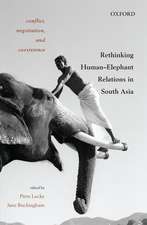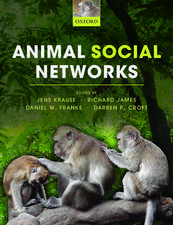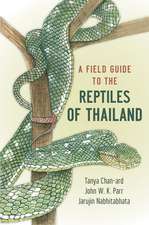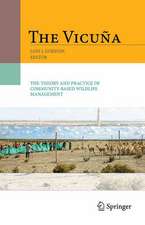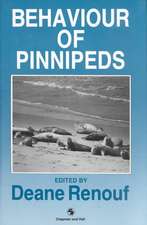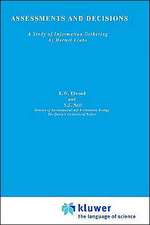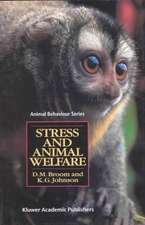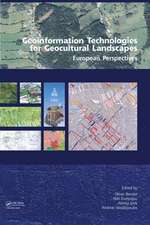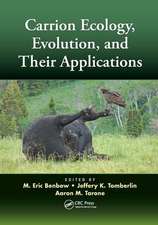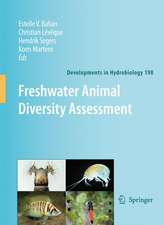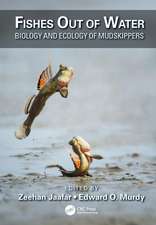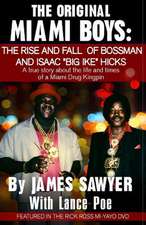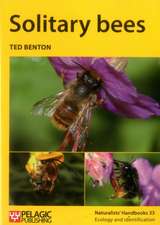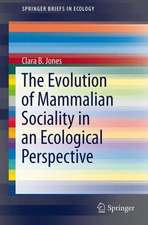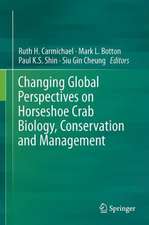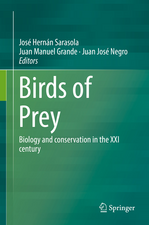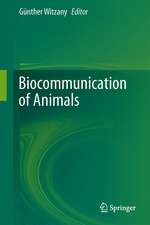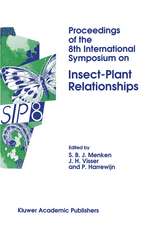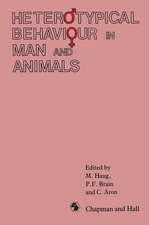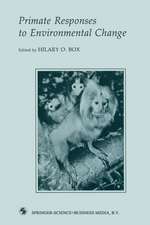Animal Management and Welfare in Natural Disasters
Autor James Sawyer, Gerardo Huertasen Limba Engleză Hardback – 3 iul 2018
The authors explore how animals are affected by specific disaster types, what their emergency and subsequent welfare needs are and the appropriate interventions. They describe the key benefits of management of animals to populations and discuss preventative measures that can be taken to reduce risk and build resilience. They also include a summary of recent debates and public policy advances on animals in disasters.
The book covers livestock, companion and wild animals, with case studies to show how the concepts can be put into practice. It provides a standalone text for students of disaster studies and management as well as professionals and NGOs who require an entry-level introduction to the subject.
| Toate formatele și edițiile | Preț | Express |
|---|---|---|
| Paperback (1) | 363.96 lei 6-8 săpt. | |
| Taylor & Francis – 4 iul 2018 | 363.96 lei 6-8 săpt. | |
| Hardback (1) | 999.46 lei 6-8 săpt. | |
| Taylor & Francis – 3 iul 2018 | 999.46 lei 6-8 săpt. |
Preț: 999.46 lei
Preț vechi: 1218.86 lei
-18% Nou
Puncte Express: 1499
Preț estimativ în valută:
191.27€ • 199.44$ • 158.96£
191.27€ • 199.44$ • 158.96£
Carte tipărită la comandă
Livrare economică 20 martie-03 aprilie
Preluare comenzi: 021 569.72.76
Specificații
ISBN-13: 9781138190665
ISBN-10: 1138190667
Pagini: 202
Ilustrații: 2 Line drawings, black and white; 24 Halftones, black and white; 2 Tables, black and white; 28 Illustrations, black and white
Dimensiuni: 156 x 234 x 13 mm
Greutate: 0.43 kg
Ediția:1
Editura: Taylor & Francis
Colecția Routledge
Locul publicării:Oxford, United Kingdom
ISBN-10: 1138190667
Pagini: 202
Ilustrații: 2 Line drawings, black and white; 24 Halftones, black and white; 2 Tables, black and white; 28 Illustrations, black and white
Dimensiuni: 156 x 234 x 13 mm
Greutate: 0.43 kg
Ediția:1
Editura: Taylor & Francis
Colecția Routledge
Locul publicării:Oxford, United Kingdom
Public țintă
Postgraduate, Professional, and UndergraduateCuprins
1. Why Help Animals in Disaster? 2. Key Principles and Mechanisms of Disaster Management 3. The Impact of Disasters on Animal Welfare 4. The Immediate Rescue of Animals 5. Immediate Relief for Animals 6. Supporting the Recovery of Animals 7. Preparing People and Animals for Disaster 8. Reducing Risks for Animals Vulnerable to Disaster 9. The Role of Animal Professionals in Disasters 10. The Future for Animal Welfare in Disasters
Notă biografică
James Sawyer currently works as Director of Programmes at CDP, formally the Carbon Disclosure Project. James was Global Director of Disaster Management for World Animal Protection for nine years, providing strategic direction for the organisation’s liaison with national governments, UN agencies and the International Federation of the Red Cross and Red Crescent Societies. During his time at World Animal Protection he responded to many disasters including Cyclone Haiyan in the Philippines, Cyclone Pam in Vanuatu and the Mongolian Dzud of 2016. He has also worked as an international advisor for the British Animal Rescue and Trauma Association (BARTA) and holds an MSc in Emergency Planning and Disaster Management, is a Fellow of the Royal Geographical Society and a Chartered Geographer. James is a specialist in remote field team management with over 20 years of experience.
Gerardo Huertas currently works as Global Director of the Animals in Disasters Campaign for World Animal Protection. He has over 35 years of experience delivering disaster relief for animals across the world, including post-war operations in Nicaragua, Kosovo and Afghanistan, and other events such as the Haiti earthquake and the Indian Tsunami. His work has pioneered innovative solutions to climate change adaptation and diaster risk reduction for animals. His current role focuses on the most disaster vulnerable countries in the world and campaigning for the integration of animals into national policy frameworks. He holds an MSc in Biology, Human Resources and advanced studies in Law and Project Management.
Gerardo Huertas currently works as Global Director of the Animals in Disasters Campaign for World Animal Protection. He has over 35 years of experience delivering disaster relief for animals across the world, including post-war operations in Nicaragua, Kosovo and Afghanistan, and other events such as the Haiti earthquake and the Indian Tsunami. His work has pioneered innovative solutions to climate change adaptation and diaster risk reduction for animals. His current role focuses on the most disaster vulnerable countries in the world and campaigning for the integration of animals into national policy frameworks. He holds an MSc in Biology, Human Resources and advanced studies in Law and Project Management.
Recenzii
"The authors have created a critical first text offering accessible and useful reference on such a vital, emerging topic. Their wealth of experience gained in the field of strategic animal rescue is clear and this will no doubt, quite literally, become "the book" for rescue professionals, first responders, aid agencies, NGOs and hopefully governments across both the developing and developed world." - Jeanette Allen, The Horse Trust, UK
"This book is a great primer for anyone who has work as a first responder or is interested in the importance of animals in disaster management. The survival of animals and their communities are intricately linked. This book is a must read for anyone in civil service, animal protection or disaster management fields." - Jackson Zee, Disaster Relief Unit, FOUR PAWS International
"This book represents years of work and dedication to the welfare of animals and the environment. Additionally, it includes the experience and learnings captured and transformed into a reference volume contributing to the understanding of the importance of protecting animals during disaster situations. It explores the efforts made and direct relationships the topic has with various fields, including health, development and the economy, all within the sphere of risk management and human security." – Nancy Astorga M., School of Veterinary Medicine, National University, Costa Rica
"The Central American Policy on Comprehensive Disaster Risk Management (PCGIR) alongside the Sendai Framework for Disaster Risk Reduction 2015-2030, establishes the importance and commitment to implement initiatives geared towards reducing the risk and vulnerability associated with livelihoods, including social services and goods related to agriculture and livestock. We consider this publication a must-read for further understanding the vital linkage between disaster risk reduction, resilience and animal protection, considering the cycle that unites human and animal life, from both a socioeconomic and a human and animal rights perspective." - Roy Barboza Sequeira, Executive Secretary CEPREDENAC, Guatemala
"In an increasingly anthropocene age we are still far too anthropogenic in our understanding and prioritization of problems. The theme of animal safety during hazard events is illustrative of this. Insufficient has been done to assure animal welfare during crisis, therefore protecting their fundamental "life" rights under hazardous conditions that many times are the result of human action, but which would also protect humans through maintenance of livelihoods based on animals that are critical for near to a billion persons worldwide. This book is key and critical for increasing awareness of this problem." - Allan Lavell, winner of the UNISDR Sasakawa DRR Award 2015 and former member of the IRDR Science Committee
"Without a doubt a much needed book that will contribute to the creation of resilience." - Ricardo Mena, UNISDR, Switzerland
"This book is a great primer for anyone who has work as a first responder or is interested in the importance of animals in disaster management. The survival of animals and their communities are intricately linked. This book is a must read for anyone in civil service, animal protection or disaster management fields." - Jackson Zee, Disaster Relief Unit, FOUR PAWS International
"This book represents years of work and dedication to the welfare of animals and the environment. Additionally, it includes the experience and learnings captured and transformed into a reference volume contributing to the understanding of the importance of protecting animals during disaster situations. It explores the efforts made and direct relationships the topic has with various fields, including health, development and the economy, all within the sphere of risk management and human security." – Nancy Astorga M., School of Veterinary Medicine, National University, Costa Rica
"The Central American Policy on Comprehensive Disaster Risk Management (PCGIR) alongside the Sendai Framework for Disaster Risk Reduction 2015-2030, establishes the importance and commitment to implement initiatives geared towards reducing the risk and vulnerability associated with livelihoods, including social services and goods related to agriculture and livestock. We consider this publication a must-read for further understanding the vital linkage between disaster risk reduction, resilience and animal protection, considering the cycle that unites human and animal life, from both a socioeconomic and a human and animal rights perspective." - Roy Barboza Sequeira, Executive Secretary CEPREDENAC, Guatemala
"In an increasingly anthropocene age we are still far too anthropogenic in our understanding and prioritization of problems. The theme of animal safety during hazard events is illustrative of this. Insufficient has been done to assure animal welfare during crisis, therefore protecting their fundamental "life" rights under hazardous conditions that many times are the result of human action, but which would also protect humans through maintenance of livelihoods based on animals that are critical for near to a billion persons worldwide. This book is key and critical for increasing awareness of this problem." - Allan Lavell, winner of the UNISDR Sasakawa DRR Award 2015 and former member of the IRDR Science Committee
"Without a doubt a much needed book that will contribute to the creation of resilience." - Ricardo Mena, UNISDR, Switzerland
Descriere
The devastating effects of natural disasters are not only directly on humans and infrastructure, but also on animals, which may be crucial to the livelihoods of many people. This book considers the needs of animals in the aftermath of disasters and explains the importance of looking to their welfare in extreme events.
